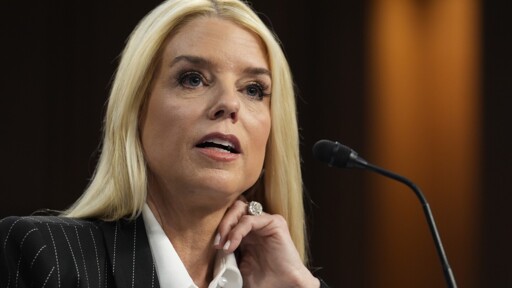Summary
The Senate confirmed Pam Bondi as U.S. attorney general in a 54-46 vote, solidifying a key Trump ally at the Justice Department.
Bondi, a former Florida attorney general, is expected to reshape the DOJ, which has faced mass firings of officials linked to Trump-related investigations.
She has echoed Trump’s claims of a “weaponized” justice system and refused to rule out prosecuting his adversaries.



Winning the primary decides whether or not someone can run as a candidate in the general election. Either you need that explained because you don’t know anything about primaries or you are pretending to not understand what you’re reading.
Your reading comprehension is failing you again. Having no vetting process doesn’t guarentee the candidate is a “secret conservative” it just increases the chances of it happening. I’m surprised I need to explain that again.
vetting noun [ U ] US /ˈvet.ɪŋ/ UK /ˈvet.ɪŋ/ the action of examining someone or something carefully to make certain that they are or it is acceptable or suitable for something
It’s literally the definition of what they are doing with closed primaries. Why does that need to be explained to you?
OMFG dude, I’m going to explain to you how closed primaries work, step by step, and how they differ from open primaries, because you clearly have no idea what the fuck they are or how they’re different. Let’s do PA vs MA since we were already talking about them.
To be a primary candidate in PA, you need a certain number of signatures, to fill out a candidate affidavit, and pay a filing fee. That’s it. In MA, it’s virtually the same, except you have to prove you’ve been a party member for at least 90 days. Do you see how it’s just as easy (technically slightly easier) to become a party candidate in a closed primary as an open? Do you see how there’s no additional vetting that goes into it?
The difference comes in the voting. In closed primaries, only registered members of the party get to vote, while in open primaries, anyone can request a ballot for any party. However, they can only choose one, so they have to decide which party’s primary they want to vote in. Some people get scared that this will cause, “bad actors,” to screw up a party’s primary, but there aren’t any examples of that successfully happening. Most people just want to participate in the primary for the party that most closely reflects their views.
However, closed primaries are in danger of producing worse candidates. Since people who choose not to affiliate with either party (which has become growing plurality over the last few decades) can’t participate, the party primaries are being determined by a smaller, more partisan portion of the population. You could even say they’re being vetted by fewer people. They can produce candidates that are more extreme or less representative of the general electorate.
So, no, dude, closed primaries don’t keep faux progressives like Fetterman off the ballot. They don’t add another layer of vetting to the process. They’re not some vanguard against bad actors who want to mess with a party’s nominating system. They just ensure that fewer people can take part in the Democratic process. That’s why 70% of states favor open primaries over closed. Now please, sit down.